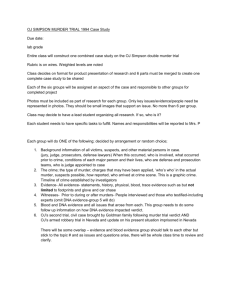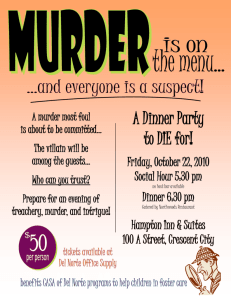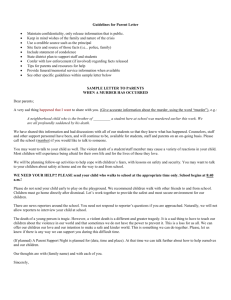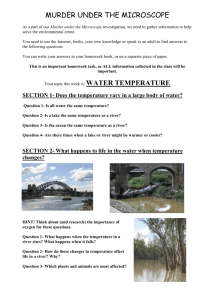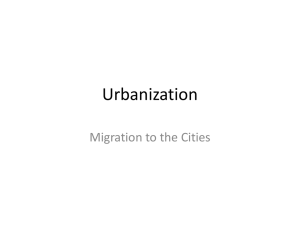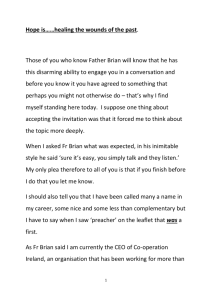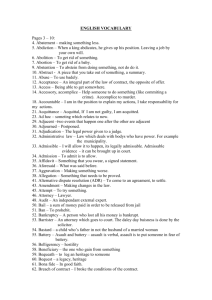Murder at Porto Beach
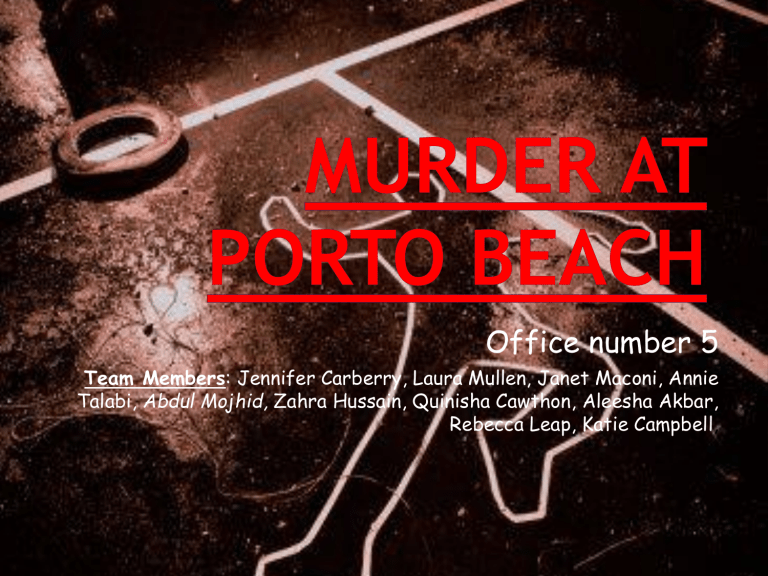
Office number 5
Team Members: Jennifer Carberry, Laura Mullen, Janet Maconi, Annie
Talabi, Abdul Mojhid, Zahra Hussain, Quinisha Cawthon, Aleesha Akbar,
Rebecca Leap, Katie Campbe ll ,
This report has been produced with the aim of summarising the main work by Office 5 over a 5 week long investigation of six murders in PortoBeach...
Week one consisted of the team introducing themselves and deciding on roles which best suited everyone’s skills.
(Excluding latecomers Quinisha Cawthon, Aleesha Akbar,
Rebecca Leap, and Katie Campbell who were all assigned roles when they joined)
Specific case studies were contributed by each member which included varied cases of serial family murder, child murder, domestic murder, gang-related murders, and football-related murders
Discussions on these specific case studies commenced
Victim profiling commenced and continued into week two
The Senior Investigation Officer appointed was Janet
Maconi
The key skills exercised in week one were:
Communication skills - we discussed in depth the specific nature of the murders and how they could be linked
Group work and co-operation - in decision making during the development of victim profiles
Creativity – in the development of victim profiles with a unique theme of retaliation organised crime related killings. All contributions were well thought out and imaginative.
Critical and analytical skills – in discussing the case studies e.g. we discovered that gathering evidence is essential but not all evidence should be taken at ‘face-value’ such as, confessions which can be a coerced
Research skills – everyone displayed their ability to find and analyse a case study article to contribute
The murder victims were found to have the following characteristics:
Gender: 5 male, 1 female
Race: 4 caucasian, 1 hispanic and 1 black carribbean;
Class: 3 working class, 3 middle class; various occupations
Locality: 2 inside licensed premises; 1 inside residence; 2 outside residence and 1 unknown
Weapon choice linked all murders i.e. Knife; all were killed by a single stab wound
All victims (apart from the initial murder) had one finger cut off linking the murders
All victims were witnesses to the killing of a notorious gangster creating a further link to organised crime groups
Janet (UWF) - Senior Investigating Officer (SIO)
Annie (MMU) - Public Information Coordinator (PIC)
Laura (GCU) - Public Information Researcher (PIR)
Rebecca (MMU) - Public Information Researcher (PIR) 2
Jennifer (GCU) - Public Information Officer (PIO)
Abdul (MMU) - Geographic Information Analyst (GIA)
Katie (MMU) - Geographic Information Analyst (GIA) 2
Zahra (MMU) - Statistical Analyst (SA)
Aleesha Akbar (MMU) - Statistical Analyst (SA) 2
Quinisha (UWF) - Evidence Disclosure Officer (EDO)
Ana (MMU) - Evidence Disclosure Officer (EDO)
Question 1 – Compared to England, Scotland and Florida would you consider PortoBeach to have a high/average/low murder rate?
The statistical analysis of data found:
It was discovered that Scotland had a rate of 1.9, in comparison with
England with 1.37 and Florida with 6.4, so between these three it is clear that Florida has the highest murder rate.
However, when compared to the murder rate for PortoBeach, which was found to be 3.82, it is clear that PortoBeach’s rate is higher than both Scotland and England but lower than Florida. Therefore, it could be considered average. The table below clearly represents this finding.
Question 2 – Is the murder rate at PortoBeach stable/rising/falling?
The statistical analysis of data found:
In terms of the murder rates of Porto Beach, it was agreed that there was no stability in PortoBeach’s murder rate as the figures rise and fall throughout the year with no identifiable pattern. This finding is represented by the chart below which shows the rate of murder by month from April 2008 to September 2009:
However, when analysing figures on a year by year basis (as the table below shows) it can be seen that the rate has been rising year by year from April to September 2008-2009, rather than on a month by month basis. There has been an increase for every comparable month with the exception of June only
How the team responded to budget cuts and an additional new murder:
The team agreed that we should try to make savings by reducing resources in other areas by re-directing police resources to immediate concerns, appealing for more public cooperation, and using the media more actively
We also argued that due to the special circumstances we should put pressure on government officials for additional funding
In response to the occurrence of a sixth murder, police presence was to be re-directed to the PortoBeach area to reduce public unrest
The key skills exercised in week two were:
Research Skills – displayed by team members finding and contributing statistical data from each locality
Literacy and Numeracy Skills – demonstrated by the team when completing and discussing the statistical analysis. In the discussion of the analysis, it was recognised that data must be analysed with care as one set of data told us that the rate of murder in
PortoBeach was unstable and another that it was rising
Communication Skills – resolutions for the budget cuts were thoughtfully discussed
Problem Solving Skills – actions were devised to remain effective whilst working on a budget
Scotland’s Community Links
Scottish Witness Liaison Unit
provides support and assistance to witnesses under threat to ensure they can provide evidence securely and safely
Serious and Organised Crime Taskforce (SOCT) aims “to put serious criminals behind bars”
Florida’s Community Links
Bridgeway Center Inc
Palm Beach County Victim Services
England’s Community Links
SOCA (Serious and Organised Crime Agency)
Crime Reduction Partnership UK
This week the following question was discussed:
What does vigilantism mean to the authority of the police?
There is not a solitary definition but ‘vigilantism’ as a term encompasses the taking of the law into ones own hands, often by means of violence; removing authority from the police to tackle crime by potentially producing more crime themselves and therefore wasting police time
A vigilante group, also labelled as ‘outlaws’, seek to address issues which, to them, have not been dealt with sufficiently by the authorities. This attitude and expression of it in public can undermine the efforts made by the police
Vigilante behaviour can cause moral panics by raising issues of concern coercively, putting more pressure on the police
Despite negative connotations of vigilante behaviour,
‘vigilant’ groups with positive impacts do exist. For example,
Neighbourhood Watch Schemes who co-operate with the police authorities
Key skills exercised in week three include:
Research Skills – in searching and reported community links from each locality
Communication, Critical and Analytical Skills – in discussing vigilantism from various perspectives e.g. as a positive phenomena and in a negative light
Team work and Creativity – members were contributing examples of vigilante groups and movies encompassing ideas of vigilantism
Self Management Skills – everyone displayed the ability to individually contribute relevant community links
Key points communicated in the press release:
An announcement of progress being made in the investigation
The awareness of the link to organised crime was raised to reduce fear in the community by assuring the low risk of victimisation
The launch of the zero tolerance campaign detailing efforts being made with increased police patrols of ‘hotspot’ areas and licensed premises which constituted the most common locus
An announcement of our multi-agency approach to tackling organised crime through the sharing of intelligence with international community links
A clear message was sent to vigilante groups to inform them that their behaviour is not and will not be tolerated
An invite was made to the public to join the fight to tackle organised crime and to assist in the investigation, informing of how their actions hinder investigations
An appeal for information was made to the public and by taking fear of victimisation into account, the alternative choice of emailing information was offered
Each officer will now give a reflective account of the investigation from their own perspective...
I believe I have satisfied my role as Public Information
Researcher to the best of my ability and beyond!
Contributions made:
Researched each task at every opportunity, reported back information and shared references with the team regularly, produced a media campaign and press release, provided regular updates to the team, encouraged team work throughout, initiated and engaged in all discussions, made attempts to improve operations and processes, made all contributions in a timely manner, co-operated consistently with others etc
The biggest challenge faced:
Gaining participation from team members was difficult with the exception of a few who deserve recognition for their contributions
(namely Jennifer, Janet, Annie and Abdul). This lack of involvement did hinder the investigation significantly
Useful skills acquired:
Excellent time management skills by meeting weekly deadlines early, increased creativity due to the fictional nature of the investigation, improved online communication skills due to participating in regular discussions
Contributions I have made:
I contributed to all discussions by giving my opinions and suggesting new ideas which could help the team.
I made a conscious effort to complete all the tasks in time, in order to allow for further discussions to take place about our findings.
I initiated the start of the PowerPoint presentation and helped edit it.
Biggest challenge:
I would suggest the biggest challenge faced in this hub was the lack of involvement by other group members. As many of the tasks specified group discussions it became difficult to complete, as many members were absent.
Where the tasks asked for a comparison between all three countries it became difficult as we were missing vital findings from some students.
Skills acquired:
I have developed my communication skills by taking part in this hub group, as a vital part of the success included daily discussions of tasks.
I have also enhanced my research skills, by searching for statistics and information relating to the tasks, this, I feel could benefit me in future employment.
Contributions Made
I believe that I contributed my fair share to the investigation. I will however admit that some other team members contributed significantly more ( Laura,
Jennifer, Annie and Janet). Reflecting on this, I could have played a bigger role.
I participated in most discussions regarding our investigation as well as trying to add some humour to the team.
As for my role within the team, I feel that I did it well. I established the basic plotline which was improved upon by other key members of the team.
Difficulties
One major difficulty was team participation. Not all of the team members participated and there are a few who I don’t think even logged in. Thankfully, we had members who were willing to pick up the slack who are mentioned above.
There are a few other obstacles that we came across but these were easily overcome thanks to Janet, who was willing to guide.
Skills Acquired
I have improved my research skills as I needed to search for several statistics which were from a credible source.
I have also improved on my communication skills as we were required to take part in multiple discussions
Contributions I have made:
Completed all individual weekly tasks on time
Preparing the weekly report for the police Chief each week
Actively participated in discussions each week
Attempted to encourage team members to participate and complete weekly tasks in a timely manner
Biggest challenge:
The lack of communication between members was the biggest challenge. My role is to improve operations, decrease turnaround times, and streamline work processes. The first week we did not complete our task on time, but each week we did complete each task quicker than the week before. Once we became aware that many of our members were not participating, active members of the group took on their responsibilities and week in beginning each tasks and Annie, Abdul, and I followed their lead.
Skills acquired:
how to compare statistics from different areas that may not all be measured in the same way.
I also learned time management skills and how to work with others to complete a task were inactive during the project.
Contributions made:
Individual tasks completed
Participated in some discussions
I Could have participated more then I did
Biggest challenge:
Keeping up to date with the tasks. I completed most tasks, but some I had no idea about, such as the budget task. A few times I struggled understanding what the tasks required us to do. My group members however did a great job explaining what we had to do, therefore I was able to complete tasks with their help.
Skills acquired:
Time management
Improved research skills
Improved communication skills
Contributions I have made:
Completed all individual weekly tasks on time
Tried to contribute to discussions
Biggest challenge:
I felt that my biggest challenge was communicating with the group, I felt that some members of the group had a bigger influence and thus for this reason at times I felt I did not know what I was doing as I already found the tasks quite confusing.
Skills acquired:
I feel that I have picked up some research skills and have learnt how to compare statistics as this was my weakness.
I learnt that although we worked in a group a lot of this project was done individually and in order to gain a voice you have to in put quickly and sufficiently.
CONTRIBUTIONS MADE:
I always made sure that I completed all of the weekly tasks.
Organised the roles at the beginning, reminding the group of everyone’s roles.
Created several pages for each weekly task.
Contributed to discussions within the group.
I feel I contributed well to the team. It wasn’t always easy but it was still manageable, making regular contributions to the team page and updating weekly tasks that were set
BIGGEST CHALLENGES:
Late comers- It was a bit difficult at first because when we started we only had 5 people in our group which made it quite hard as this meant that we had to wait for people before we could fully begin, as we didn’t want anybody to miss out and it wouldn’t have been fair for our group if we had more than one role.
Messages- members of the group were not checking there messages regularly which made it a bit hard sometimes to make decisions when no one replied
USEFUL SKILLS AQUIRED:
Interpersonal skills-
Communication skills- Over the past few weeks whilst working as part of an online multi-disciplinary team, my communication skills have improved immensely by taking part in group discussion and participating in weekly tasks
